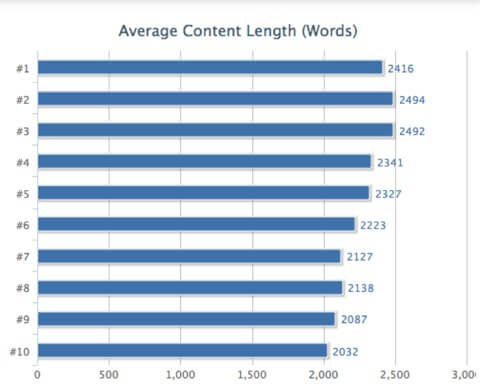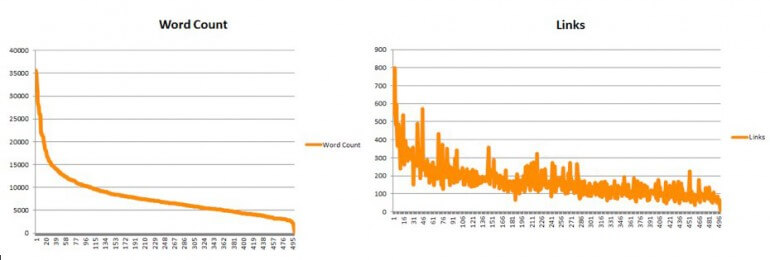 By Garrett Moon
By Garrett Moon
Long-form content is changing everything online.
Google takes long-form content seriously, so we should too.
That might be bad news for those who don’t like writing much, but for the rest of us, it’s about time we started making a place for long-form content on our blog.
In a recent post, Neil Patel outlined a bit of the trend towards long-form writing. By long-form, we’re talking a minimum of 2,000 words per post.
As a comparison, this post is less than 700 words long. Oy!
Long-Form Content and Search Rankings
Long-form content has a direct affect on search rankings.
SERPIQ did an analysis of the top 10 search results for more than 20,000 keywords and revealed a surprising pattern. The length of content on the page had a direct correlation to the placement of the search results.
In other words, the top 10 positions on Google for many keywords is content that contains at least 2,000 words.

This may come as a pretty big surprise for those of us who have been under the impression that 500 – 700 words is the sweet spot. The evidence suggests that might not be the case.

Neil performed an analysis of the number of link backs a post received, and the number of words in the post. Again, there was a direct correlation. Long-form content was more likely to be linked to from another site.
My Own Findings
I decided to try it for myself. I did a few searches for terms such as “content marketing,” “how to groom a beard,” and “consolidate grad school loans.”
Then I charted my results.
These were, of course, random keywords, and my results not statistically relevant in any way. But despite that, I ended up with some compelling results.
In all of my searches (there were only six), the average word count for the first result came in at 2,013 words, just a hair over the minimum 2,000 words. This trend didn’t continue down the line, but it did seem to be a factor.
For example, I noticed the long-form pages were often associated with a high page authority score, meaning they were often weighted more heavily by Google.
I also noticed an instance where a page with a low page authority score was able to rank well because of its 3,000+ words. Conclusive? No. Interesting? Yes.
Is it Time for Long-Form Content?
After reviewing my own results, I am far from completely convinced, but there certainly seems to be something at work to support the idea.
Obviously, my data is not statistically relevant enough to make a final conclusion, but it has piqued my curiosity enough to experiment further with long-form content.
For now, I have committed to at least one post per week over the 2,500 word threshold mark.
Results pending!
One of the things we know for sure is long-form content is no silver bullet.
Neil’s results highlight the value of high-quality content that gets a large number of links.
Does it so happen that longer content occasionally results in a better quality page? Sure, but not always.
There are many other factors Google takes into consideration.
Should You Try More Long-Form Content?
So, all of this begs the question, “Should I be using more long form content on my blog?”
I think the answer is yes, but only as long as you can handle it without turning into a word zombie.
You shouldn’t be writing more words simply for the sake of ranking better. Rather, you should be doing it for the sake of helping the reader.
If the post calls for it, and you have enough to say, go for it.
Whatever the case, it does seem to be time for us to turn off the hard rules on content length, and start experimenting more. Google just may reward you.
What do you think about long-form content marketing? Does it help? What are the implications?